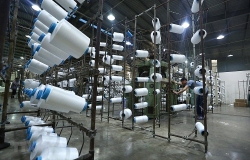
Creating sustainable businesses in Vietnam: Experts
Latest
| TIN LIÊN QUAN | |
| Vietnam, EU share perspectives in sustainable maritime development | |
| Tax officials reduce inspections to help businesses amid COVID-19 | |
 |
| Illustrative image. (Photo: Internet) |
But for Vietnam’s small and medium-sized enterprises (SMEs) this could be a challenging prospect, they admitted.
In a survey by Japanese electronics giant Epson of 864 SMEs in six of Southeast Asia’s largest countries by GDP, 62 percent of respondents in Vietnam cited cost as the reason for not updating technologies.
With SMEs contributing 40 percent of Vietnam’s GDP, it is vital for them to be competitive in the regional and global markets. This means that business owners need to be building sustainable businesses that can adapt easily to change from an operation and environmental perspective.
SMEs are at the heart of the nation’s economy, employing 51 percent of the workforce and accounting for 98 percent of all enterprises, and as such need to be empowered with the right tools to participate successfully in the emerging digital economy, the report said.
Companies are also becoming increasingly aware of the need to act sustainably since this can positively impact company efficiency, brand value and reputation, growth, and stakeholder relations.
From an operations perspective, SMEs can benefit from the adoption of sustainable business practices through the reduction of operating costs by selecting hardware that supports business objectives and streamlines energy use.
Streamlining energy usage and reducing SMEs’ carbon footprint is an ideal way to lower operating costs in the long run and be better for the environment.
For example, retailers can now deploy point-of-sale (POS) printers that connect easily with other technologies and make printing reliable and easy to use for business owners.
Eighty-one percent of Vietnamese respondents saw this connectivity as a key benefit.
Offices can also manage printing costs more sustainably with environment-friendly heat-free printers, and on-demand color label printers not only save costs but also reduce wastage – a boon for SME food manufacturers chasing product sales.
However, fostering digital transformation requires more than the adoption of new technologies. Today this means creating environments where businesses can leverage innovation to deliver meaningful change that drives positive business outcomes.
Epson believes that sustainability can be addressed through investment in new technologies that also have a reduced environmental impact.
The company’s environmental vision for 2050 sets out a goal to provide products and services that contribute to the environment by making efficient use of energy and resources and reducing the environmental impacts of production processes and customers’ business processes.

| Vietnam, EU share perspectives in sustainable maritime development Vietnam and the European Union (EU) can supplement each other in the implementation of their maritime development strategies for win-win cooperation, heard a dialogue in ... |

| Experts: EVFTA looks towards sustainable development EVFTA not only promotes Vietnam – EU’s trade and investment growth, but also creates a driving force to boost cooperation in improving growth quality, towards ... |

| 2,000 national flags presented to Thanh Hoa’s fishermen “Nguoi lao dong” (The Labourer) newspaper on July 22 handed over 2,000 national flags to the authority of the north central province of Thanh Hoa ... |

























